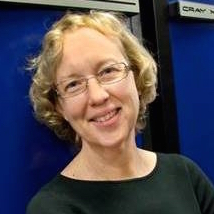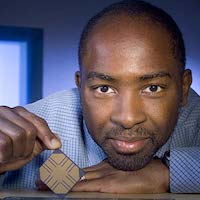Digital Computing Beyond Moore’s Law
May 3-4, 2018
Parc 55 - San Francisco, California
55 Cyril Magnin Street, San Francisco, CA 94102, United States
Event Contact
Ann Drobnis
adrobnis@cra.org
2022662936
Event Type
2018 Events, 2018 Visioning Activities
Event Category
Tags
The historical increases in computing performance and reductions in power consumption, size, weight and cost of computing devices are ingrained in the fabric of the research community. These improvements have fueled innovation across scientific domains, health, industry, and government. But clock speeds have been relatively flat for over a decade and current transistor scaling will be reaching limits that are both technological and economic over the next decade. While alternative models of computation are being explored, including quantum and neuro-inspired, digital computing will remain the dominant computational technology for the foreseeable future.
To address the continued demands for more computing, specialization is one of the few levers left at the architectural level, as is evident from the recent development of processors for convolutional neural nets. Open source hardware models, new tools to aid in chip design and testing, and emerging chiplet models for fabrication all support the growth in specialization, but how to build robust and performant software ecosystems in this environment remains a challenge. Our hypothesis is that effective specialization will benefit from input from experts in applications that we seek to accelerate, as well as experts in programming languages, compilers, and architecture. This workshop will mix all of this expertise to seek to generalize previous point successes like accelerating deep neural networks with the TensorFlow API and the Tensor Processing Unit hardware. Following introductory presentations of trends and emerging ideas in hardware, software and applications, the workshop members will break into vertically integrated teams and develop a set of case studies for specialization.
Participants will identify computer science challenges and possible approaches to the problem of building correct, maintainable and efficient software for future digital architectures using a set of case studies to explore these ideas. Increased parallelism at finer scales and locality will be major cross-cutting themes. The case study topics may shift somewhat based on workshop participant interests, but are likely to cover: machine learning beyond convolutional neural nets; streaming image analytics; high performance scientific simulation and analysis; and bioinformatics / medicine.
The workshop will explore the research questions in each area in depth and produce a report on the workshop’s findings:
- What type of architectural model would accelerate an important application or set of applications in the area?
- What approaches could be used to program those applications?
- How would code generation be optimized for the hardware?
- Is there a new notion of portability?
- Are there particular correctness, privacy or security concerns to be addressed, and if so, how?
- How broad is the class of applications that could benefit from this approach?
May 3, 2018 (Thursday)
| 11:00 AM | Lunch | Embarcadero Room |
| 12:00 PM | Welcome and Lightning Introductions | Embarcadero Room |
| 12:40 PM | Machine Learning Beyond Convolutional Neural Nets Presentation | Embarcadero Room |
| 01:00 PM | Streaming Images Presentation | Embarcadero Room |
| 01:20 PM | Biology and Medicine Presentation
| Embarcadero Room Srinivas Aluru |
| 01:40 PM | Discussion | Embarcadero Room |
| 02:20 PM | Programming Systems Mini-Panel
| Embarcadero Room
|
| 02:50 PM | Break | Embarcadero Room |
| 03:10 PM | Breakouts | Sutro, Divisadero, and Haight Rooms |
| 05:10 PM | Report Back | Embarcadero Room |
| 06:00 PM | Dinner | Embarcadero Room |
May 4, 2018 (Friday)
| 08:00 AM | Breakfast Available | Embarcadero Room |
| 09:00 AM | Discussion of Day One Reports | Embarcadero Room |
| 10:00 AM | Discussion and Identification of Cross-cutting Themes | Embarcadero Room |
| 10:30 AM | Break | Embarcadero Room |
| 11:00 AM | Crosscutting Group Breakouts | Sutro, Divisadero, and Haight Rooms |
| 12:00 PM | Lunch with Application Breakout Groups | Embarcadero Room |
| 01:00 PM | Application Breakouts | Sutro, Divisadero, and Haight Rooms |
| 02:30 PM | Break |
| 03:00 PM | Final Report Outs | Embarcadero Room |
| 04:00 PM | Wrap-up and Workshop and Next Steps | Embarcadero Room |
| 04:30 PM | Conclude Workshop |
Kathy Yelick, University of California at Berkeley |
Kunle Olukotun, Stanford UniversityThis text is invisible |
The Computing Community Consortium (CCC) will cover travel expenses for all participants who desire it. Participants are asked to make their own travel arrangements to get to the workshop, including purchasing airline tickets. Following the symposium, CCC will circulate a reimbursement form that participants will need to complete and submit, along with copies of receipts for amounts exceeding $75.
In general, standard Federal travel policies apply: CCC will reimburse for non-refundable economy airfare on U.S. Flag carriers; and no alcohol will be covered.
For more information, please see the Guidelines for Participant Reimbursements from CCC.
Additional questions about the reimbursement policy should be directed to Ann Drobnis, CCC Director (adrobnis [at] cra.org).
CCC Slides Templates:
Day 1 Breakouts:
Day 2 Breakouts:






